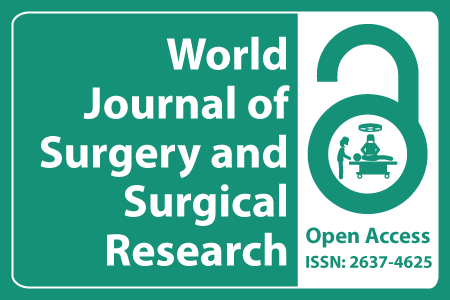
Journal Basic Info
- Impact Factor: 1.989**
- H-Index: 6
- ISSN: 2637-4625
- DOI: 10.25107/2637-4625
Major Scope
- Cardiothoracic Surgery
- Endocrine Surgery
- Ophthalmology
- Plastic Surgery
- Robotic Surgery
- Urological Surgery
- Ophthalmology & Eye Surgery
- Anesthesiology
Abstract
Citation: World J Surg Surg Res. 2021;4(1):1299.DOI: 10.25107/2637-4625.1299
Favorable Postoperative Complication Rate after Neoadjuvant Therapy and Transanal Full Thickness Local Excision for Rectal Cancer
Amr Aref*, Abdelkadr Hawasli, Ahmed Abdalla, Amr Alame, Mohammed Barawi, Adli Yakan and Ernesto Drelichman
Rectal Cancer Group, Van Elslander Cancer Center, Ascension St. John Hospital, Detroit, USA
PDF Full Text Research Article | Open Access
Abstract:
Purpose: Full thickness Local Excision (LE) for patients with Moderately Advanced Rectal Cancer
(MARC) whose tumors respond favorably to neoadjuvant therapy is one approach for organ
preservation. Some authors have suggested abandoning LE due to frequent and severe postoperative
complications. We report post-operative complications following neoadjuvant therapy and LE for
MARC after modifications to the LE surgical technique and radiotherapy field and dose.
Methods: Between May 2017 to October 2020, 14 patients were diagnosed with MARC; 9 were
treated in a phase II prospective trial and received neoadjuvant therapy, followed by limited full
thickness LE with no/minimal Margins (LLE) after Complete Clinical Response (CCR) of their
tumors. Five additional patients were treated off protocol and received only chemoradiotherapy
followed by LLE. The radiation therapy dose ranged from 45 Gy to 54 Gy.
Results: Two patients with tumors extending to the dentate line experienced grade III postoperative
complications of severe pain, infection, and fistula formation. One patient was treated with a seton
and the other had a complete abdominoperineal resection due to residual tumor post-LLE of the 12
remaining patients with tumors located 3 cm to 8 cm from the anal verge, only two patients (17%)
developed grade II toxicity requiring non-operative management. In both cases, symptoms resolved
within 1 week.
Conclusion: Managing MARC with LE after neoadjuvant therapy with CCR should not be
abandoned. Modifying the preoperative radiation field and dose, along with LLE and avoiding
resection into the dentate line, produces acceptable post-operative complications. This approach
remains a viable option for achieving 3 organ preservation for select patients.
Keywords:
Chemo-radiotherapy; Local excision; Rectal cancer
Cite the Article:
Aref A, Hawasli A, Abdalla A, Alame A, Barawi M, Yakan A, et al. Favorable Postoperative Complication Rate after Neoadjuvant Therapy and Transanal Full Thickness Local Excision for Rectal Cancer. World J Surg Surgical Res. 2021; 4: 1299..













